Islamabad, October 30th: The Centre for Law and Security (CLAS) convened a high-level roundtable titled “Understanding AI and Misinformation Through the Lens of the Indo-Pak Conflict 2025”, bringing together prominent policy experts, academics, and media analysts to examine the complex intersection of artificial intelligence (AI), information warfare, and national security in South Asia.
Ambassador Sardar Maqsood Khan provided historical context, noting that misinformation and disinformation have existed since the earliest wars but have been weaponized through AI and deepfake technologies today. He distinguished misinformation as unintentional and disinformation as deliberate, emphasizing the urgent need for legal structures to verify content and counter false narratives in real time. He proposed several key steps for Pakistan, including investing in narrative-building, strengthening North-South technological collaboration, enhancing AI capacity, and developing algorithmic literacy.
Mr. Salman Javed, Director of South Asia Times, provided an in-depth overview of AI’s emergence as both a technological and information weapon. He traced the phenomenon of AI back to the 2025 Indo-Pak conflict marked the first instance where AI was deployed as a direct instrument of warfare. Mr. Javed revealed that AI-generated misinformation reached unprecedented levels with 68% of online content during the conflict being AI-generated and 427 viral posts on X (formerly Twitter) proven fake. Videos such as a fabricated statement from Pakistan’s Prime Minister and simulated attacks on Islamabad garnered millions of views, while hundreds of Indian accounts spreading false narratives were blocked. He stressed that Pakistan’s response remained reactive rather than corrective, pointing to the urgent need for faster and more sophisticated fact-checking mechanisms.
Mr. Muhammad Faizan Fakhar, Senior Research Associate at the Centre for Aerospace and Security Studies (CASS), discussed AI’s role as both a “content creator” and “content pusher.” He highlighted how algorithms prioritize content designed to provoke emotion and destruction, referring to the “dead internet theory,” under which more than 51% of content online was AI-generated or AI-pushed. He cited cases such as AI-generated videos about the Myanmar crisis and fabricated anti-Pakistan content shared by high-level Indian officials, including members of the BJP. “AI is no longer just a tool, it has become an agent shaping perceptions,” he warned.
Dr. Qamar Cheema, Executive Director of the Sanober Institute, emphasized the shift toward cognitive warfare, noting that despite India’s vast information infrastructure over 400 satellite channels its narrative collapsed. He highlighted Pakistan’s success in downing Rafale jets and India’s inability to substantiate its wartime claims. Dr. Cheema noted that Pakistan’s 60% literacy rate made it particularly vulnerable to AI-generated misinformation, urging both countries to invest in public media literacy and narrative management. He also underscored Pakistan’s right to self-defense under Article 51 of the UN Charter, warning that India’s political frustration and domestic silence over the Phalgam attack reveal deeper governance challenges.
Ms. Zunira Taj, legal analyst and researcher, drew attention to source verification as a timeless principle of jurisprudence that must be revived in digital contexts. She cautioned that the centralization of AI control could place immense narrative power in the hands of a few individuals, observing that future wars will be fought through perceptions and ideologies rather than solely through arms.
The discussion was moderated by Mr. Rehman Azhar, Executive Director at CLAS, who outlined the Centre’s core objective was to explore the evolving relationship between technology, governance, and security. He emphasized that AI falls within the broader domain of cyberspace and has rapidly become an integral part of every sphere of life. Highlighting the roundtable’s aims, Mr. Azhar noted three key objectives: understanding the role of AI in shaping public narratives during the Indo-Pak war, assessing its impact on national security, and exploring policy mechanisms to regulate AI use in the future.
The session concluded with a consensus that the Global South lacks a strong voice in shaping AI norms, which remain dominated by the West. Speakers recommended that social media companies be restricted from hosting unverified AI-generated videos and that large language models (LLMs) be trained in local languages to ensure fairness, cultural relevance, and inclusivity.
Closing the session, Mr. Rehman Azhar reaffirmed CLAS’s commitment to promoting responsible AI governance and fostering informed public discourse. He stressed that the 2025 conflict underscored AI’s double-edged role as a force for innovation and as a destabilizing element when left unchecked.The roundtable highlighted the growing urgency for national preparedness, cross-sector coordination, and ethical AI frameworks to safeguard Pakistan’s information integrity and strategic stability

